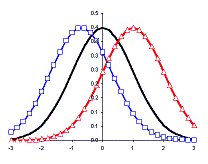| Vitae | Goal Statement | Coursework | Analytical & Integrated Thinking | Research | Professional Experiences | Dissertation Planning |
Statement of Goals:
Portfolio II:
As I approach the dissertation phase
of my program I am becoming more anxious about completing the most
critical
part of my graduate training but excited about the thought of finally
obtaining
my degree. Although I already began the program with very clear goals,
I feel
as though the more experience I gain, the more defined my professional,
research, and academic goals become. Specifically, in terms of my
professional
goals, I have always known that I wanted to be in academia and conduct
research
in a field that was of interest to me. However, I am now more open to
other
positions outside of academia. Additionally, the more I learn about
research
methodology and theories, the more refined my research goals become.
During my second year, I had
designed, carried out, and completed a research project in addition to
submitting my undergraduate thesis for publication. Although I enjoyed
streamlining and picking out the theoretical and methodological details
of my
research project, I realized that I am more passionate about the topic
itself than
of the actual research process. Specifically, although social cognitive
theory,
self-regulation, and motivation have and will continue to serve as the
foundation of my research, the more I learn about education, the more
interested I am in how these constructs operate with regards to race
and
gender.
As
I said in my previous goals
statement, learning about Critical Race Theory opened up my mind to the
bigger
problems in education. However, I struggled to find a way to
empirically
research these concepts within the domain of education. Therefore, to
pursue my
new passion in social issues, I began to read and expose myself to
social
justice issues and discovered the idea of stigma consciousness and
stereotype
threat. The work of Steele, Aronson, and Pinel has undoubtedly refined
my
research interests and goals. The more I read about the concepts,
however, the
more overwhelmed I became at exactly how I was going to untangle the
relationship between stereotypes, self-regulation, and achievement.
In
order to successfully untangle that relationship,
I decided that my first step was to equip myself with the proper
methodological
skills. Therefore, my main academic goal was to take as many methods
classes as
possible while I delved deeper into the stereotypes and self-regulation
research. As I discussed previously, I am more interested in
quantitative
techniques than I am of qualitative methods, however, as I read deeper
into the
social justice and stereotypes literature, it was apparent that a
qualitative
approach was also needed. Stereotypes and learning is such a complex
topic that
assigning a numerical value to “measure” these constructs
does not accurately
capture its complexities. Therefore, I decided to enroll in a mixed
methods
course. Although it is still quite difficult for me to cohesively and
appropriately mesh together two different methods, it is one of my
goals to
master this type of approach so I can affectively reach my research
goals.
As
I was completing my stereotypes
project, I was also submitting and resubmitting my thesis for
publication. In
fact, I am currently waiting to hear back from one of the journals
about their
decision. During that same time, I had also submitted my stigma
consciousness
study for publication. Although I had mentally prepared myself for
rejection—coping with the actual rejection is not easy. This
process is very
frustrating and demoralizing because the manuscript was rejected
several times
and with each time, revisions had to be made. Although it is my goal to
publish, I began to wonder what type of impact that would have on the
status of
education and as a professor. I think that this program emphasizes to
students
to take the leadership role and use what we learn and our degree as an
opportunity to make a difference. I had worked very hard on my
stereotypes
study and as I was submitting it, I was excited but also wondering
about: “what
happens next?” What will happen after it gets published?
Unsurprisingly, it was
rejected and I currently have 5 pages of revisions to complete. This
was when I
began to question how effectively my professional goal will meet my
long term
personal goals to actually make a difference. I truly do want to make a
difference--which is the ultimate driving force behind my motivation to
complete my doctoral studies. In the Program Evaluation course, I
learned that
there are other just as effective outlets for advancing education other
than
academia. In fact, the instructor even mentioned that academic research
may
take a back seat to evaluation research, where the impact of evaluation
research may supersede the impact of academic research. Therefore, I
realized
that I do not need to have an
academic position in order for me to feel satisfied. I will be content
with my
career as long as I am in a field that advances education through
research. I
realize that I will be satisfied with any path I take in my career
(e.g.,
academia or private), as long as there is a good balance between
research and
application.
PreDoctoral Studies
Portfolio I Goals Statement
